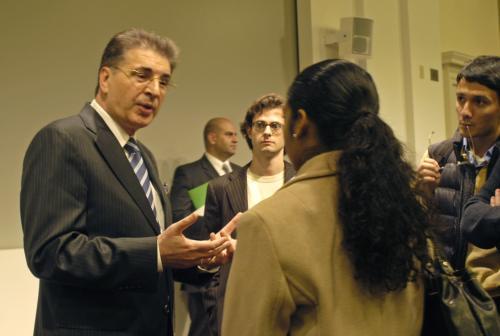Srgjan Kerim, the president of the United Nations General Assembly, remembered the novelty of a globalization course he created at the University of Belgrade some 30 years ago.
“Everyone thought it was just a fantasy,” he said.
Today, that fantasy is real, he told an audience at Harvard Business School’s Spangler Auditorium last night.
“I’m dealing now with the problems and implications of globalization on a daily basis,” Kerim said.
The Macedonian Kerim, an economist by training, has also served as an ambassador from Macedonia to many nations in Europe. Now, as the General Assembly’s president, his job is to propose debate topics and moderates its sessions. Kerim’s appearance was one of the opening events of the Business School’s International Week. A spectrum of languages resonated throughout the air in the auditorium, where many international students had gathered.
In his speech, Kerim tried to address the question of whether or not globalization will undercut national sovereignty. “Now you can’t have one without the other,” he said.
The U.N.’s management and coherence need to be improved and private companies brought into play, he said.
It is necessary “to bring the private sector and NGO’s into the international policy making process... [and to] disaggregate and redistribute sovereignty at the international level,” Kerim said.
As far as the involvement of young adults in politics, Kerim stressed that “The UN badly needs this younger mind-set [that is] influenced heavily by the globalized world.”
Dutch B. Leonard, Jr., professor of public management at the Kennedy School of Government, said Kerim’s speech could help to broaden international perspectives at Harvard.
“When I first came to Harvard in 1970 this event couldn’t have happened,” Leonard said. “Harvard has changed because of the global commitment of students at this school.”
Read more in News
Artist Flashes Creativity













